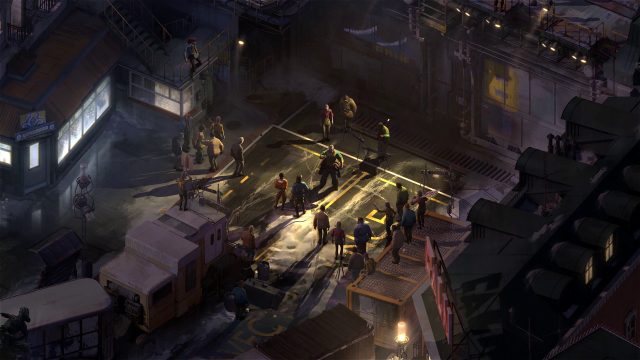3. Apex Legends

Respawn Entertainment; PS4, Xbox One, PC
Apex Legends is pretty much exactly what it looks like: another battle royale game in the vein of Fortnite and PUBG mixed with the character shooter elements of Overwatch. But if the tech industry at large has taught us anything over the years, it’s that there is plenty of value to be found in a well-executed rip-off.What Apex lacks in creative ambition, it makes up for in Destiny-level responsiveness, consistent internal logic, and common-sense quality-of-life improvements to the battle royale formula. Its primary verbs—run, slide, shoot, jump—feel as satisfying as you’d expect from the guys who created Call of Duty and Titanfall (and satisfaction is the point here). All battle royale games should forever copy its ping system, which genuinely facilitates communication without forcing you to talk to weirdos online when you aren’t in the mood.
It still features the things any good battle royale does: every improvisation you make in a round stems from that initial drop; it encourages forward thinking and risk assessment more than wanton combat; every gun, attachment, and special ability has its own character and impact on the way you play; there's the shared understanding of values within the player base and of the importance of listening. It’ll still get your heart pumping when the end is near. There’s little groundbreaking about Apex, but there’s plenty refined. Just ignore the price of character skins.
-Jeff Dunn
2. Disco Elysium

ZA/UM; Windows, PS4, Xbox One
The best character in a video game this year is one I nurtured into being: a washed-up alcoholic detective with strong communist sensibilities and a penchant for talking about the uncaring void with his horrific necktie. Waking one morning with a case of heavy-drinking-induced amnesia, your character in Disco Elysium must glue together the shattered pieces of his psyche while also trying to solve a murder case in a gritty, post-failed-revolution world.Those “pieces of psyche” actually function as upgradable skills—and as characters that pop up in your head to put their two cents in during conversations. Empathy calls attention to emotional cues, while Rhetoric pipes up with arguments you can use against interview subjects. Weirder skills, like Inland Empire, butt in to harass you with David Lynchian anxieties about the strange and unknown. The different parts of your brain help steer you into breakthroughs, but they also argue with each other and very occasionally give less-than-responsible advice (electrochemistry screeches at you constantly to do as many drugs as possible). Idle thoughts can be nurtured into full-blown parts of your personality, making you a “hobo cop,” a suicidal depressive, a staunch nationalist, etc.
There is no combat system; everything is handled through reams of text, dialogue choices, and simple dice-roll checks. The writing is uniformly excellent—easily the most engaging writing we’ve seen in the modern CRPG renaissance—and there’s no “right” way to play. I often worry about making a bad decision or failing an important check in RPGs; Disco Elysium begs you to simply roleplay at all times, and it rewards you with a character that’s all your own. Fail a check and you’ll often find yourself in a different, but equally advantageous, position as if you passed it.
Disco Elysium’s inventive gameplay systems all work together wonderfully, but in a game full of endless words, it's the writing that seals the deal. It’s easily one of the best RPGs in years.
-Aaron Zimmerman
1. Control
-
Those floating bodies? Yeah, they're everywhere. And sometimes they fight back.
-
Telekinesis may not be a real thing, but in Control, it's really fun.
-
When possessed enemies are defeated in Control, they explode in pretty satisfying fashion.
-
More oil-smear effects when enemies go kaboom. Though don't kid yourself; this game is rated M for a reason, primarily thanks to all the dead, scattered bodies around this Federal Bureau of Control (FBC) facility.
-
Jesse has important business to attend to as the newly appointed chief of the FBC.
-
Whenever players enter a new section of the FBC, a dramatic, all-caps logo announces it.
-
A better look at a similarly eerie, glowing-red hallway full of monsters.
-
The FBC's former director somehow talks telepathically to you.
-
Optional video sequences explain some of the FBC's studies and experiments.
-
Or you can watch them on old CRT TVs.
-
Ahti has a lot to say throughout the game. Very rarely does he make sense.
-
At least Jess acknowledges how weird he sounds.
-
This children's series about the effects of supernatural forces is darkly hilarious.
-
C is not for "cookie."
-
Some dramatic sequences end with Jesse removing the "Hiss" effects from everyday objects.
-
I'm always a fan of video game signage that takes fictional catastrophes really seriously.
Remedy; Windows, PS4, Xbox One
Control isn't just the best video game ever made by Remedy Entertainment. It's also everything I want in an action-adventure video game. That begins with a telekinetic control system that makes the game's hero, Jesse, an accessible-yet-powerful badass in terms of laying waste to mobs of eerie enemies. There's a real genius to Control's melting of abilities and energy meter at any given moment, as this forces players to juggle Jesse's range of guns and superpowers in ways that would make any X-Man or Jedi blush.What's more, this enthralling core is smothered with world-building, mysteries, and likable characters every step of the way, whether you restrict yourself to the primary plot or sink your teeth into a surprisingly meaty series of side missions. We knew Remedy could get that stuff right; Alan Wake and Quantum Break are proof that the Finnish studio's game-story mastery wasn't a fluke. But finally, the attached gameplay is back to Max Payne levels of polish.
Admittedly, Control's console performance was trash at launch, but its demanding engine has since received welcome patches so that you don't have to be a PC gamer to lap up a worthy aesthetic experience. PC players still get the best version of the year's best game, should their GPU of choice support DirectX 12 ray tracing. And based on how remarkable that version looks, we might urge you to commit crimes to get your Control-playing PC up to ray tracing snuff.
-Sam Machkovech
reader comments
90